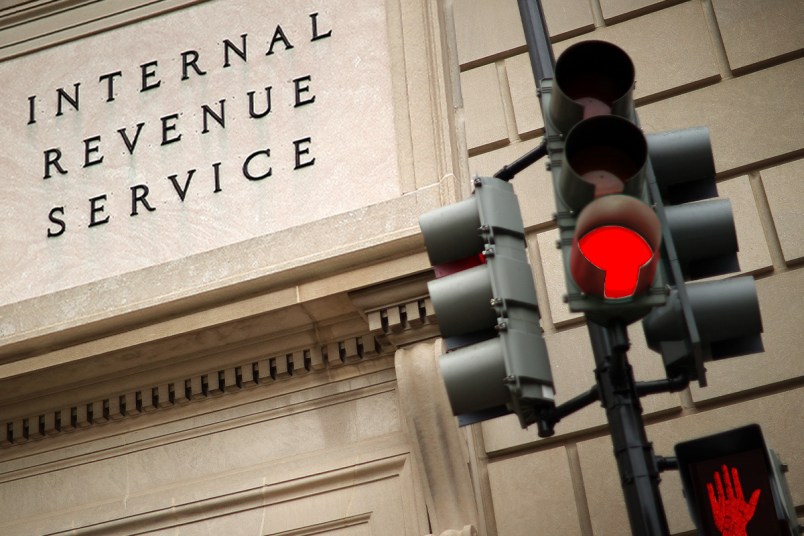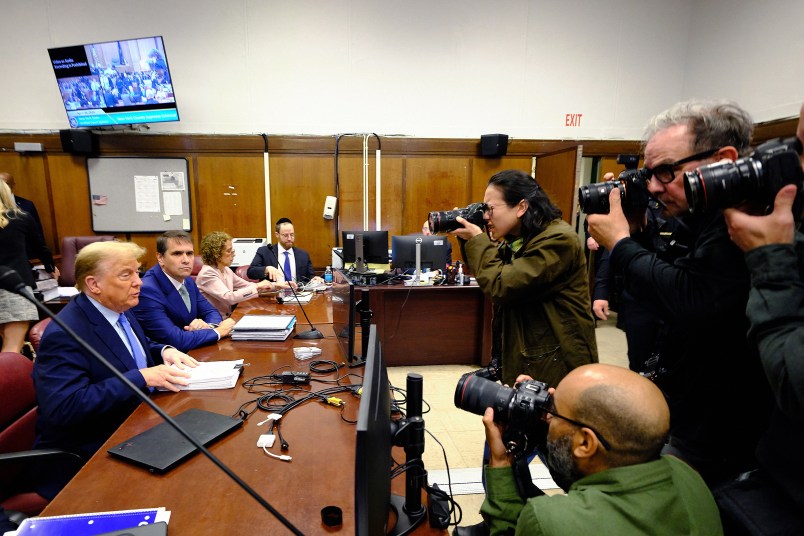If there was a defined Republican talking point during the debate preceding the House passage of the Inflation Reduction Act, it was this: that the bill would mean the hiring of 87,000 new, armed IRS agents kicking down the doors of middle class America and killing the people they find inside.
Rep. John Yarmuth (D-KY) chuckled the first time he debunked a very loud recitation of the conspiracy theory by Rep. Lauren Boebert (R-CO), but the humor had drained from his fact checks as he corrected the claim over and over again during the next hour.
The outlandish talking point is being parroted not just by conspiracy theory-minded House freshmen like Boebert. It’s coming from some of the highest-profile Republican senators too.
Sen. Rick Scott (R-FL), head of the National Republican Senatorial Committee, published a letter addressed to “American job seekers” warning them that applying to the IRS means that “you not only need to be ready to audit and investigate your fellow hardworking Americans, your neighbors and friends, you need to be ready and, to use the IRS’s words, willing, to kill them.”
“Are they going to have a strike force that goes in with AK-15s already loaded, ready to shoot some small-business person in Iowa?” pondered Sen. Chuck Grassley (R-IA) on Fox and Friends.
None of that, of course, is true. Momentarily setting aside the idea of bloodthirsty tax enforcement agents, other key plot points of this dark Republican fantasy are also devoid of fact. The 87,000 number stems from an old Treasury Department report, pre-dating the IRA, estimating the number of full-time employees the agency would be able to hire by 2031 with $80 billion in additional funding. Those employees would not all be working in enforcement, but be spread across the agency. And many of them will be replacing people expected to quit or retire in the meantime.
A very small number of IRS employees — just over 2,000, per 2021 IRS data — are armed special agents. They work alongside other federal law enforcement entities, as tax crimes often overlap with other ones, like drug trafficking. As multiple tax experts reminded TPM: it was the IRS that took down Al Capone.
That’s a very small percentage of the nearly 80,000 people who work at the IRS and an even smaller percentage of the roughly 132,000 federal law enforcement officers total.
“These civil servants doing their jobs are being made into jackbooted thugs,” said Seth Hanlon, a senior fellow at the Center for American Progress and former assistant to the president for economic policy at the Obama White House’s National Economic Council.
“Grassley is the ranking member and former chair of the Finance Committee — the highest ranking Republican on tax issues and, ostensibly, a venerated senator,” he added. “The fact that he’s using this paranoid, irresponsible rhetoric is disappointing and frightening.”
This conspiracy theory, while new, builds on the work Republicans have been doing for years. By attacking the agency and ginning up baseless outrage about its behavior, they’ve smoothed the way to slash its budget and demoralize its workforce. The IRS has been hollowed out and depleted, underfunded and maligned. That has almost exclusively benefitted the very wealthy and big corporations who have the resources to hide and paper over their finances, and flotillas of lawyers to outgun the IRS auditors who come looking for them.
‘Scandals’
Republicans were rewarded politically and financially, CNN reported at the time, for holding a series of hearings in 1997 and 1998 on the supposed abuses of IRS agents.
“Republicans brought forward lots of folks testifying anonymously that the IRS is coming in and doing awful things,” Phil Hackney, associate professor at the University of Pittsburgh school of law who spent five years at the office of the chief counsel of the IRS, told TPM. “A lot of that stuff turned out to be false — it was not a true picture of what was happening at the IRS.”
Still, it generated enough momentum that a reform law passed unanimously through the Senate in ‘98. A year after it was put into effect, few IRS agent abuses were found, though employees reportedly became much more cautious about pursuing audits.
History repeated itself about 15 years later with the so-called IRS targeting controversy. It started with a 2013 admission from then-IRS unit director Lois Lerner that the agency had targeted political groups for audits when they applied for tax-exempt status. Among those groups, conservatives quickly noted, were Tea Party organizations.
“It immediately became front page news from this meeting that was very obscure — just all these tax nerds in a room,” Hackney, who was at the meeting where Lerner made the comments, said. “Then it was front page news at the Wall Street Journal and CNN. It was at once terrifying and just strange.”
It was the admission that launched 1,000 investigations and committee hearings — and is still shorthand for government bias towards conservatives in right-wing circles.
An extensive investigation by the Department of Justice and the FBI ultimately found no evidence of political bias or discriminatory intent at the IRS, and specifically cleared Lerner as being the first to try to remedy a potential problem.
“The damage was done,” Hackney said. “That moment in 2013 really led to the IRS budget going downhill for a long time and did enormous harm to the agency.”
In between the big “scandals,” the IRS periodically saw its budget slashed, especially starting in 2011 when Republicans won the House and were hellbent on cutting domestic discretionary funding. A hiring freeze stretched from 2011 to 2018, preventing the agency from bringing on new talent.
All of those accumulated attacks have left the agency a husk of itself, and unable to perform basic functions of its job. It means taxpayer queries going unanswered, egregiously outdated technology — “they’re still using COBOL!” exclaimed Hackney — and a lack of enforcement personnel (16,000 fewer now than in 2010).
Who benefits the most from a defanged tax police force? It’s not the millions of Americans with W2s and taxes withheld from paychecks, into whose earnings the IRS can see with near complete transparency. It’s the wealthy and corporations, who use tax shelters and accounting tricks and the knowledge that, on the off chance that the beleaguered agency finds the time and personnel to investigate their finances, they have the legal might to beat it back.
Enforcement of top earners has dropped off so starkly that, as of a 2019 ProPublica report, the IRS was auditing the very low-income recipients of the Earned Income Tax Credit at the same rate as it was the top one percent of taxpayers.
The United States is forgoing billions of dollars in taxes each year because of the IRS’ weakness, much of that owed by the very wealthiest in our society.
“The fundamental question is: do Republican politicians want us to have a society of law and order, or do they want the wealthy and well-connected to be exempt from the rule of law, tax and otherwise?” asked David Gamage, professor at the Indiana University Bloomington’s Maurer school of law who has served as special counsel to the Treasury Department’s Office of Tax Policy.
What Those Funds Will Actually Do
Despite the Republican conspiracy theorizing, the $80 billion over ten years from the Inflation Reduction Act will help breathe some new life into the limping agency.
More than half of the money will go towards enforcement, with the specific aim of beefing up audits on the very wealthy. Treasury Secretary Janet Yellen directed the agency not to use the new funding to boost audit rates for businesses or households making less than $400,000 a year.
Billions will also go towards modernizing the agency’s decrepit systems and bettering taxpayer services.
A key benefit of the funding, Hanlon pointed out, is that the multiyear appropriation will let the IRS — whipsawed from budget decimation to modest increases back to decimation — plan ahead.
“Finally, the IRS will be able to make a long-term plan, which it needs to do to invest in hiring and training,” he said.
It’s a much-needed boon. But Republicans, livid at the funding, will likely seize their next opportunity to hobble the agency with zeal.
“The IRS still needs its annual appropriations,” Hanlon said. “Republicans are gonna come gunning for that.”










